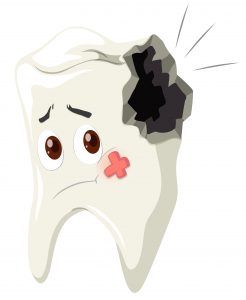Gnashing, clenching and excessively grinding the teeth is known as Bruxism. It occurs when you’re asleep as your body involuntarily moves. The disorder isn’t linked to grinding teeth during talking or eating.
The condition is a very common one with people who are known to do it called “bruxers”. Most people with the condition are unaware that they are sufferers, with about 50% of all adults in America being teeth grinders. Fortunately, only around a fifth are “bruxers”, however, they destroy the enamel of their teeth because of their excessive tooth grinding.
Children are less likely to grind teeth than adults aged 25 or over. The jaw bones and teeth of children grow more rapidly, and therefore their teeth are generally not damaged by teeth grinding. When children develop this habit, they tend to outgrow it over time, thus avoiding damage. People with Bruxism can be helped by wearing a mouthguard.
What Are The Different Kinds of Teeth Grinding?
Exhausted young woman touching her head with eyes closed. Female exchange worker suffering from unbearable headache. Health concept
There are two types of teeth grinding:
- Nocturnal or sleep Bruxism: This is the most commonly experienced type of bruxism and it occurs when the sufferer is asleep
- Awake Bruxism: This type of teeth grinding occurs in the daytime and is typically the result of anger, anxiety, stress or tension.
What Causes Teeth Grinding?
At the present time, dentists aren’t sure what causes teeth grinding. It may be because of physical or mental stress, or it could be due to allergies, earache or respiratory infections. There are even some medicines which have been associated with clenching the teeth excessively.
Although some people have a greater susceptibility to developing bruxism, there are some factors that increase the chance of having it including:
- Stress/anxiety – both can cause tooth grinding when the sufferer is awake.
- Medicines such as antidepressants can trigger bruxism.
- Excessive consumption of alcohol is associated with a 50% higher chance of developing bruxism.
- Smokers have a 50% higher chance of being bruxers as nicotine found in tobacco releases dopamine.
- People consuming large amounts of caffeinated beverages find they have an increased heartrate which, in turn, causes dopamine to be released. The release of dopamine causes bruxism.
- Taking hard drugs like ecstasy and cocaine or amphetamines can result in severe bruxism both while asleep and awake. Drugs may also cause damage to the structure of teeth and the enamel causing rotten teeth and cavities.
- In some cases, genetics cause grinding of teeth while asleep.
- Parkinson’s Disease, ADHD, obstructive sleep apnea and dementia have all been linked with bruxism.
- As we get older, we are more likely to develop bruxism.
What Are The Symptoms of Teeth Grinding?
There are several symptoms of teeth grinding including:

- Clenching the jaw and grinding the teeth
- Headaches in the temples
- Tired or painful jaw muscles
- Earache
- Pain in the neck/face
- Clicking while chewing
- Lockjaw – being unable to entirely close or open the jaw
- Erosion of the enamel on the teeth
- Damaged fillings
- Flattened teeth
- Loose, fractured and chipped teeth
- Chewed cheeks
- Sensitivity of the teeth
- Tongue indentations
Are There Risks When Bruxism Is Untreated?
When untreated, bruxism can lead to a number of dental issues including:
- Disorders in the jaw
- Severe headache or pain in the temples
- Damage to the enamel of the teeth including restorations or crowns
- Chipping and cracking of the teeth
- Tooth loss
- Shortening of teeth
What Treatment Options Are There For Bruxism?

Treating teeth grinding can be achieved in several ways including:
Splints/Mouth Guards
These are sometimes called occlusal appliances and they are designed to align the jaw and position the teeth correctly, primarily during sleep. Made from hard acrylic, they won’t become misshapen. They are made specifically for each patient to protect their teeth when clenching or grinding and to relieve jaw pain and discomfort.
Dental Correction
Patients should visit their dentist every 6 months to guard against more damage occurring. Missing and cracked teeth are a common symptoms and dentists are able to launch a plan to restore those damaged teeth involving dentures or crowns among other options.
Medication

Some medicines are effective treatments for this disorder such as:
- Muscle relaxants
- Sleep medications
- Botox injections
- Antidepressants
- Anti anxiety medication
Stress Management Treatment
If you have received a diagnosis of bruxism, you may be recommended some stress management treatments by your dentist including:
- Behavioral therapy
- CBT (cognitive behavioral therapy)
- Stress management therapy
- Biofeedback treatments
- Relaxation techniques
Treating Conditions Linked To Bruxism
Some people find their teeth grinding is connected with sleep disorders like sleep apnea. In such cases, these conditions have to be treated first before the bruxism can be corrected. There are also some other medical problems like GERD (Gastroesophageal reflux) which can cause tooth grinding and which need resolving before the bruxism can be treated.

